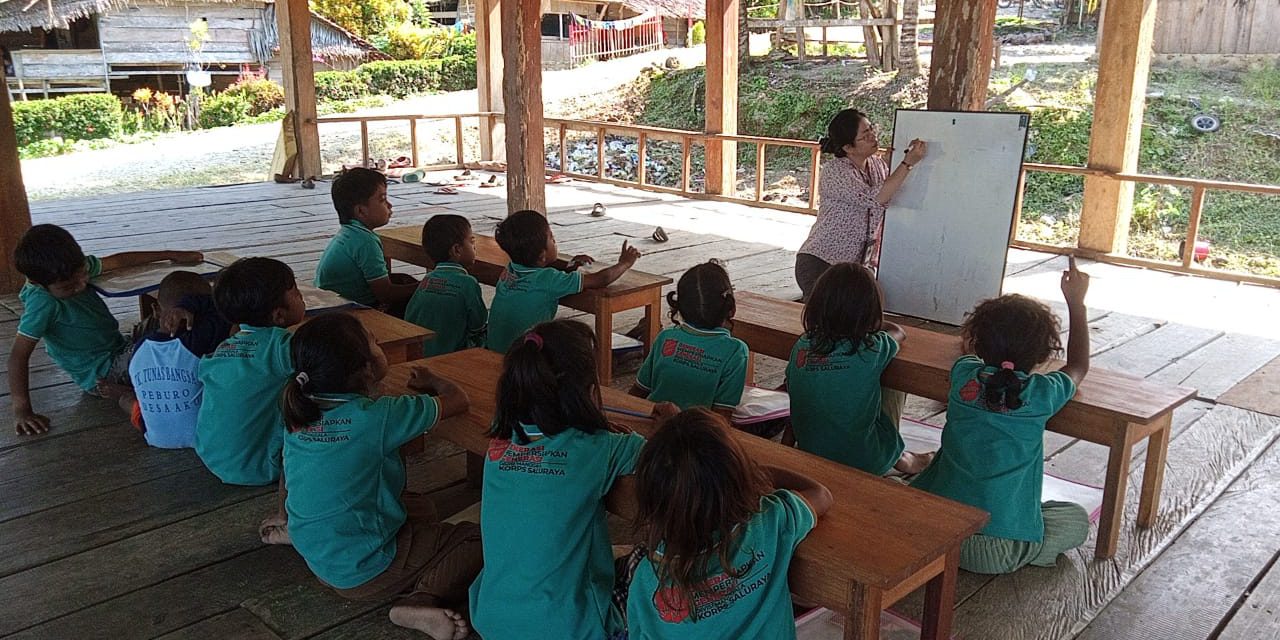
A girl in a light blue uniform eagerly raises her hand when the teacher asks her to solve an arithmetic problem on the blackboard. Based on her appearance, she looks old enough to be in the 6th grade of elementary or junior high school. However, she is still learning the curriculum typically covered in the first year of elementary school. This scene may be familiar in many educational settings, but what sets this teaching and learning activity apart is that it takes place in a stilt house. Additionally, the children attending this school are part of the Bunggu tribe.
“The school that we call ‘Forest School’ is specifically designed for the education of tribal children,” says Kartina, the school principal, who is supported by PT Pasangkayu. The Forest School was established as the first step for Bunggu tribe children to enter the world of education. Although the children in this tutoring center come from various age groups, not all of them are proficient in reading or arithmetic. The oldest student is 12 years old and still struggles with reading; however, Kartina and the other teachers observe significant progress every day.
In the future, children from the Bunggu Tribe who are proficient in reading, writing, and arithmetic will have the opportunity to attend schools supported by PT Pasangkayu and other public schools around Pasangkayu. “We will guide them through the process until they register for the national exam,” stated the school principal. This initiative will enable Bunggu Tribe children to easily access education and catch up on any missed lessons. One of the tutors, Oppie, is a member of the Bunggu Tribe and an alumnus of the school supported by PT Pasangkayu. She is currently continuing her studies in the education department at a university in Palu.
In addition to the company’s contributions, the Forest School program collaborates with the Salvation Army to develop educational programs. “From the beginning, our goal has been to assist the Bunggu Tribe by improving access to education, thereby enhancing the community’s quality of life and economy. Beyond providing educational facilities, PT Pasangkayu also works to raise awareness in the community about the benefits of education and other empowerment programs,” said Pastor Captain Vicky Malki.
In addition to providing educational support through tutoring facilities, PT Pasangkayu is also engaged in environmental education activities. These include cultivating catfish and horticultural plants, as well as promoting small businesses that produce various flavors of banana chips and shredded mushrooms. Neso, the tribal leader of the Bunggu tribe, shared, “In the past, if we wanted to eat fish, we had to catch it in the sea or purchase it from traders outside the village. Now, we can enjoy fish from our own cultivated catfish.” This improvement also holds true for other food products such as vegetables and beans.
While the current economic empowerment initiatives have enhanced the quality of life for the Bunggu tribe, it’s important to recognize that empowerment without education is like planting seeds without fertilizer. There is hope that in the future, ongoing educational programs for the Bunggu tribe will help create a new generation of members who can advance the economy and inspire innovations within the surrounding community.




